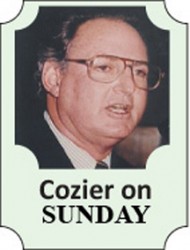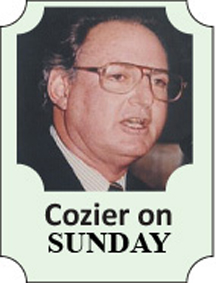INEVITABLY, the shorter the game, the more frenzied the tempo, the more exciting the action, the more unpredictable the outcome.
In less than a decade, such elements have transformed Twenty20 into the most popular of cricket’s three formats. It has spawned World championships every two years since the first in 2007 and lucrative domestic tournaments just about everywhere.
It has proved ideal for the West Indies of the 21st century for there is no more erratic, thrilling or exasperating side. Over the coming fortnight, in the fifth tournament in Bangladesh, they defend the World title they won in Sri Lanka just over a year and a half ago
In their finishing build-up, they clinched a brief series against England in Barbados that ended on Thursday, winning the first two matches before falling just five runs short in the last after tinkering with the 11.
 At No.5 in the International Cricket Council (ICC) rankings to England’s No.8, the result was not surprising; nor are Caribbean conditions at Kensington Oval likely to resemble those at the Sher-e-Bangla Stadium in Mirpur where they are based for the Super 10 matches against India, Australia, Pakistan and opponents from the qualifying round.
At No.5 in the International Cricket Council (ICC) rankings to England’s No.8, the result was not surprising; nor are Caribbean conditions at Kensington Oval likely to resemble those at the Sher-e-Bangla Stadium in Mirpur where they are based for the Super 10 matches against India, Australia, Pakistan and opponents from the qualifying round.
Yet both captain Darren Sammy and coach Ottis Gibson spoke afterwards of the significance of the series.
For Sammy, the team was carrying “good momentum” to Bangladesh after a “complete team effort” against England. Coach Ottis Gibson was even more upbeat than his captain.
“We know it’s going to be a tough job to retain the trophy but the team is in a good place at the moment,” he said as he headed off for Dhaka with his charges 24 hours after the final England match. “We know what it takes to win the tournament. We just need to look after the basics of the game that must be applied but we’re more than capable of retaining it.”
It would have been misplaced confidence a month earlier after a humbling six wickets loss to Ireland at Kingston’s Sabina Park, their fifth in successive T20Is. Even if Sammy himself, Chris Gayle and Marlon Samuels were all missing from the two in New Zealand in January through injury, the sequence was worrying.
The concern has eased. Twelve of the victorious squad of the class of 2012 return as does Gibson who is adamant that such experience is crucial. As county cricket once did for several top Test players, the Indian Premier League (IPL) and other such domestic tournaments have enabled the latest generation to hone skills necessary for the artificiality of such an abbreviated format.
Gayle, the left-handed strongman, is widely recognized as the game’s most intimidating hitter. Sunil Narine, the finger-flicking spinner of confusing variations, is ranked No.2 Twenty20 bowler by the ICC; his 3.4-0-9-3 spell was a decisive factor victory in the final in 2012, backing up Marlon Samuels’ remarkable 78 from 56 balls, with six disappearing sixes.
Gayle has overcome the hamstring and back problems that kept him inactive for three months after pulling out of the Indian tour in late November. Samuels is fit again after wrist surgery, Sammy’s hamstring strain has recovered.
Now 34, Gayle has been constant throughout the previous World Twenty20s since belting 117 off 57 balls, with 10 sixes, against South Africa in the match that launched the whole thing in Johannesburg in 2007. He is nearing the end of his career but he remains key at the top of the order.
It is such striking power, not Gayle’s alone, that makes the West Indies so potentially dangerous. Even without the formidable Keiron Pollard, an irreplaceable absentee whose knee problems persist, six-hitting is an overall speciality. Gayle, Samuels, Sammy, Dwayne Bravo and Dwayne Smith have hoisted 161 in 187 innings between them.
Sammy identified the game plan as maximizing the power play (the first six overs) and finishing strong. Pretty obvious but not easily accomplished.
In the series against England, Gayle and Dwayne Smith plundered 58 and 56 from the first six. In the first, Samuels and Andre Russell took 55 from the last four. In the second, Sammy, as clean a hitter as anyone, slammed 30 off nine balls to secure the win.
When Gayle rested for the last match, three were down for 28 in the fifth over and five for 67 after 11; Lendl Simmons, in-form wicket-keeper Denesh Ramdin and Sammy took 93 off the last nine to carry the result down to the last ball.
While the total can’t be reliant on Gayle alone, Narine also needs support with the ball.
As Bangladesh is the location, the surprise is that he and the deceptive leggie Samuel Badree, a new ball specialist and a crucial cog in the 2012 success, are the only specialist spinners. Samuels counts as a third while trundling his off-breaks.
The selectors have opted, instead, for two left-arm Jamaicans of contrasting methods. Sheldon Cottrell, is a barrel-chested one-time soldier who deals in speed; Krishmar Santokie is a round-arm medium-pacer, whose direct, full-length control and change of pace, have pigeon-holed him as a Twenty20 bowler (he was in the West Indies under-15 team in England in 2000, is now 29 but has never had a first-class match).
Three quarters of Santokie’s 89 wickets in Twenty20 matches (a mere five internationals) are either bowled or lbw, his economy rate under six an over. He has been signed up by the Mumbai Indians for IPL 2014; he could well be the surprise packet of the tournament.
With the Bangladesh tournament in mind, it is instructive to follow their path to their eventual triumph in 2012. It was typically bumpy.
On the way, they fell in the first round to Australia by 17 runs under the Duckworth-Lewis method, were overwhelmed by Sri Lanka by nine wickets at the Super Eight stage and would have been eliminated two days later had substitute Dwayne Smith’s radar been an inch off target with his throw from the deep that ran out Doug Bracewell with scores tied. It threw them the life-line of the eliminator over; they seized it gratefully.
They suddenly become unstoppable. In the semi, they crushed their previous conquerors, Australia, by 74 runs; two days later Chris Gayle was leading them in celebration of their first global championship since the 2004 Champions Trophy with the elaborate Gangnam Style dance, incongruously introducing a Korean pop-hit into cricket folklore.
Samuels’ brilliance hauled them out of the hole of 32 for two at 10 overs. Their intensity in the field and Narine’s magic made a barely serviceable total of 137 for six appear monstrous as a dumbstruck crowd of 30,000 at Colombo’s Premadasa Stadium watched their team go under by 36 runs.
In the interim, the West Indies have contested 13 Twenty20 Internationals; their inconsistency has remained consistent. They won four in succession after Colombo, then lost five straight leading into the series against England.
It explains why the reigning champions can either go out in the first round in Bangladesh or brush aside every one in their way to retaining the trophy. Any other way, they just wouldn’t be the West Indies that, in spite of everything, we all still know and love.









